Ditapis dengan
E-book Against the Fetishisation of Plural Time
This book raises three interlinked questions: first, how to do a social history of time; second, what are the ways in which it can be done without succumbing to the usual, and at times inevitable, pull of some of the useful binaries in which most of the historical accounts of time have been written; and third, how, as a result of overcoming some of these binaries, do we go beyond simply sta…
- Edisi
- -
- ISBN/ISSN
- 9783111696492
- Deskripsi Fisik
- 133 hlm
- Judul Seri
- -
- No. Panggil
- 300.1 SIN a

E-book Violent Impacts How Power and Inequality Shape the Concussion Crisis
Concerns regarding brain injury in sport have escalated into what is often termed a “concussion crisis,” fueled by high-profile lawsuits and deaths. Although athletes are central figures in this narrative, they comprise only a small proportion of the people who experience brain injuries, while other high-risk groups—including victims of domestic violence and police brutality—are all too…
- Edisi
- -
- ISBN/ISSN
- 9780520396999
- Deskripsi Fisik
- 232 hlmn
- Judul Seri
- -
- No. Panggil
- 362.1 HEN v

E-book Who is prepared for the new digital age? Evidence from the EIB Invest…
In the fight against the Coronavirus, digital technology is playing an unprecedented role in the maintenance of daily life and economic and social activities, as well as the recovery of industries and business activities. The Coronovirus-pandemic could become a tipping point for digitalisation - a dawn of a new era - by accelerating the maturity of digital technology: What was once a ‘nice to…
- Edisi
- -
- ISBN/ISSN
- 9789286145810
- Deskripsi Fisik
- -
- Judul Seri
- -
- No. Panggil
- 338.4 Ban w
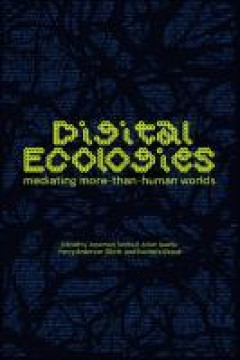
E-book Digital Ecologies
In an era of mass extinction, climate emergency, and biodiversity collapse, what role do digital media have in securing liveable futures? To what extent are digital media mitigating or intensifying environmental crises? And what theoretical, empirical, and methodological frameworks are needed to make sense of emerging digital ecologies? In a context where digital media are reshaping the futures…
- Edisi
- -
- ISBN/ISSN
- 9781526170354
- Deskripsi Fisik
- 296 hlmn
- Judul Seri
- -
- No. Panggil
- 302.231 TUM d

E-book Media Use in Digital Everyday Life
The ebook edition of this title is Open Access and freely available to read online. As digital technologies have become ever more ingrained in society, Media Use in Digital Everyday Life asks how our relationship with media has changed. After the proliferation of smartphones, social media and ubiquitous connectivity, what has happened to the ways we navigate across social domains and structure …
- Edisi
- -
- ISBN/ISSN
- 9781802623857
- Deskripsi Fisik
- 112 hlmn
- Judul Seri
- -
- No. Panggil
- 302.231 ARN m
E-book Beijing : Foreign Investment Guide
Beijing, the capital of the People's Republic of China, is also the national political center, cultural center, international exchange center, and scientific and technological innovation center. It takes the lead domestically and even globally in multiple strategic emerging industries, and gathers rich resources of technology, finance, culture, talents and international elements. The city is be…
- Edisi
- -
- ISBN/ISSN
- -
- Deskripsi Fisik
- 129 hlm
- Judul Seri
- -
- No. Panggil
- 332.6 CIF b

E-book Women and Public Life in Early Meiji Japan The Development of the Fem…
Women and Public Life in Early Meiji Japan focuses on women’s activities in the new public spaces of Meiji Japan. With chapters on public, private, and missionary schools for girls, their students, and teachers, on social and political groups women created, on female employment, and on women’s participation in print media, this book offers a new perspective on nineteenth- and early twentiet…
- Edisi
- -
- ISBN/ISSN
- -
- Deskripsi Fisik
- 241 hlmn
- Judul Seri
- -
- No. Panggil
- 305.4 PAT w
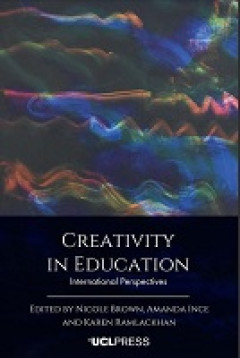
E-book Creativity in Education International Perspectives
Creativity has become a buzzword across all disciplines in education and across all phases, from early years through to tertiary education. Although the meaning of creativity can change vastly depending on the global educational setting, it is impossible to ignore the applicability and relevance of creativity as an educational tool, philosophical framework and pedagogical approach. Through case…
- Edisi
- -
- ISBN/ISSN
- 9781800080669
- Deskripsi Fisik
- 236 hlmn
- Judul Seri
- -
- No. Panggil
- 370.15 BRO c

E-book The 21st Century Ladz Continuity and Changes among Marginalised Young…
The ebook edition of this title is Open Access and freely available to read online. School-to-work transition studies have a rich sociological history that has traditionally focused on marginalised young men, until recently. Returning the focus to the most marginalised working-class young within a contemporary context, The 21st Century Ladz explores changing ideas of manhood, masculinities and …
- Edisi
- -
- ISBN/ISSN
- 9781837976331
- Deskripsi Fisik
- 173hlmn
- Judul Seri
- -
- No. Panggil
- 305.31 GAT t

E-book Peer Relationships at School New Perspectives on Migration and Diversity
Available Open Access digitally under CC-BY-NC-ND licence. This book draws on ethnographic research in two UK secondary schools, considering the shifting roles of migration status, language, ethnicity, religion and precarity in young people’s peer relationships. The book challenges culturalist understandings of social cohesion, highlighting the divisive impacts of neoliberalism, from pervasiv…
- Edisi
- -
- ISBN/ISSN
- 9781529235777
- Deskripsi Fisik
- 157 hlmn
- Judul Seri
- -
- No. Panggil
- 371.102 SOY p
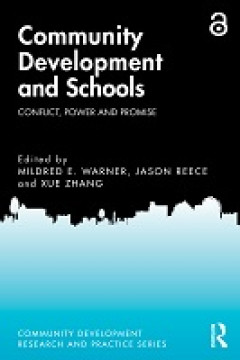
E-book Community Development and Schools
This book lays out the promise and potential of schools as community-building institutions. It explores the challenges faced in incorporating schools into broader community development policy, and also recognizes the changing demographics of schools and their need to integrate with economic development policy in order to promote broader community development. The book includes chapters on tax a…
- Edisi
- -
- ISBN/ISSN
- 9781040120682
- Deskripsi Fisik
- -
- Judul Seri
- -
- No. Panggil
- 371.9 WAR c

E-book Translating Human Right in Eucation
The 2006 United Nations Convention on the Rights of Persons with Disabilities (UN CRPD) is the first human rights treaty to explicitly acknowledge the right to education for persons with disabilities. In order to realize this right, the convention’s Article 24 mandates state parties to ensure inclusive education systems that overcome outright exclusion as well as segregation in special educat…
- Edisi
- -
- ISBN/ISSN
- 9780472902705
- Deskripsi Fisik
- 206 hlmn
- Judul Seri
- -
- No. Panggil
- 307.115 BIE t

E-book Queer Compassion in 15 Comics
This unique comic anthology takes its readers on a journey through different art styles and queer perspectives, from first Prides to multi-generational friendships to finding community among chosen families. The comics in Queer Compassion offer kaleidoscopic insight into the colorful, heartbreaking, empowering, funny, and diverse lives of queer people around the world by centering compassion as…
- Edisi
- -
- ISBN/ISSN
- 9781634150581
- Deskripsi Fisik
- 201 hlmn
- Judul Seri
- -
- No. Panggil
- 306.76 JOY q
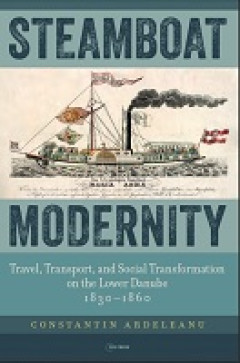
E-book Steamboat Modernity
Through a skillful combination of economic and cultural history, this book describes the impact on Moldavia and Wallachia of steam navigation on the Danube. The Danube route integrated the two principalities into a dense network of European roads and waterways. From the 1830s to the 1860s, steamboat transport transformed time and space for the areas that benefited from regular services. River t…
- Edisi
- -
- ISBN/ISSN
- 9789633867549
- Deskripsi Fisik
- 256 hlmn
- Judul Seri
- -
- No. Panggil
- 378.2 ARD s
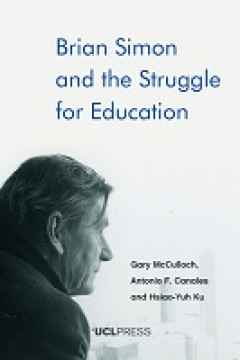
E-book Brian Simon and the Struggle for Education
This is the first full-length study of the life and career of Brian Simon (1915-2002), leading Marxist intellectual and historian of education in twentieth-century Britain. Using documentary sources that have only recently become publicly available, it reveals the remarkably broad range of Simon’s life as student, soldier and school teacher, Communist Party activist, and educational academic,…
- Edisi
- -
- ISBN/ISSN
- 97817987359819
- Deskripsi Fisik
- 206 hlmn
- Judul Seri
- -
- No. Panggil
- 370.92 MCC b
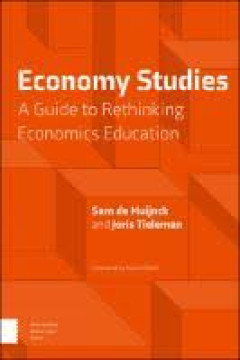
E-book Economy Studies A Guide to Rethinking Economics Education
The Economy Studies project emerged from the worldwide movement to modernise economics education, spurred on by the global financial crisis of 2008, the climate crisis, and the COVID-19 pandemic. It envisions a wide variety of economics graduates and specialists, equipped with a broad toolkit, enabling them to collectively understand and help tackle the issues the world faces today. This is a p…
- Edisi
- -
- ISBN/ISSN
- 9781040780701
- Deskripsi Fisik
- 466 hlmn
- Judul Seri
- -
- No. Panggil
- 371.334 MUI e
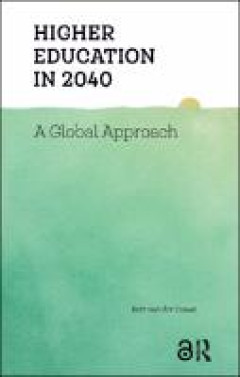
E-book Higher Education in 2040 A Global Approach
Since the Middle Ages, universities have displayed impressive resourcefulness in their ability to adapt to the changing dynamics and demands of their times. But in the last fifty years, the landscape of higher education - with the emergence of online and mass education, skyrocketing tuition, and a controversial system for ranking institutions - has begun evolving so rapidly and profoundly that …
- Edisi
- -
- ISBN/ISSN
- 9781040776728
- Deskripsi Fisik
- 256 hlmn
- Judul Seri
- -
- No. Panggil
- 378.9 ZWA h

E-book The Art of Regenerative Educatorship A Developmental Guide
A regenerative current is rising all around us. Stories of the need to reconnect, heal and transform are becoming more urgent, challenging a dominant worldview built on competition, economic growth, extractivism, militarisation and personal gain. Our planet's resources are stretched beyond their limits, causing widespread suffering and injustice for both humans and non-humans. Yet, each of us h…
- Edisi
- -
- ISBN/ISSN
- 9781040795545
- Deskripsi Fisik
- 144 hlmn
- Judul Seri
- -
- No. Panggil
- 370.1 CAR t
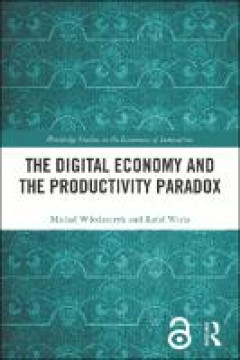
E-book The Digital Economy and the Productivity Paradox
Despite the billions of dollars invested in digitalization, productivity growth in developed economies remains sluggish and the promised technological revolution has yet to deliver its full potential. This concise book questions why digitalization is not translating into higher productivity and economic expansion, exploring this paradox through the lens of Schumpeter's creative destruction hypo…
- Edisi
- -
- ISBN/ISSN
- 9781040558027
- Deskripsi Fisik
- 210 hlmn
- Judul Seri
- -
- No. Panggil
- 338.064 WLO t

E-book The Co-evolution of Technology and Warfare Reshaping the Battlefield
This book explores the relationship between technology and warfare, by examining how recent technological advancements have revolutionized the conduct of war. The work analyses contemporary conflicts, including the Syrian civil war, the Taliban takeover in Afghanistan, and the ongoing war in Ukraine, but also by exploring future war scenarios and assessing the military capabilities of major pow…
- Edisi
- -
- ISBN/ISSN
- 9781040437391
- Deskripsi Fisik
- 178 hlmn
- Judul Seri
- -
- No. Panggil
- 355.02 GER t

E-book Designing Instruction with Generative AI
Designing Instruction with Generative AI offers a novel set of tools and strategies for leveraging generative AI to create engaging and personalized learning experiences. While instructional designers are a tremendous asset to higher education, not all colleges or universities have the robust staff needed to support all instructors on staff or large student populations. Drawing on a wealth of r…
- Edisi
- -
- ISBN/ISSN
- 9781040416440
- Deskripsi Fisik
- 180 hlmn
- Judul Seri
- -
- No. Panggil
- 371.334 AND d
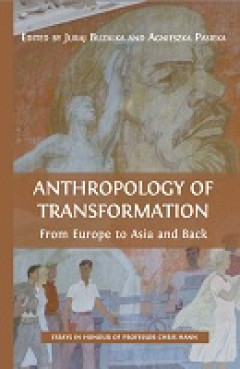
E-book Anthropology of Transformation From Europe to Asia and Back
This collection of essays is the result of the joint efforts of colleagues and students of the leading social anthropology and post-socialism theorist, Professor Chris Hann. With the thirtieth anniversary of the collapse of the Berlin Wall in 2019 as their catalyst, the authors reflect upon Chris Hann’s lifelong fieldwork in the discipline, spanning regions as diverse as East Central Europe, …
- Edisi
- -
- ISBN/ISSN
- 9781800643642
- Deskripsi Fisik
- 280 hlmn
- Judul Seri
- -
- No. Panggil
- 303.4 BUZ a
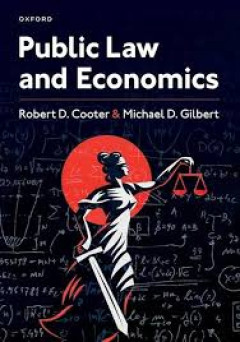
E-book Public Law and Economics
This comprehensive textbook applies economic analysis to public law. The economic analysis of law has revolutionized legal scholarship and teaching in the last half-century, but it has focused mostly on private law, business law, and criminal law. This book extends the analysis to fundamental topics in public law, such as the separation of government powers, regulation by agencies, constitution…
- Edisi
- -
- ISBN/ISSN
- 9780197655917
- Deskripsi Fisik
- 642 hlmn
- Judul Seri
- -
- No. Panggil
- 343.07 COO p
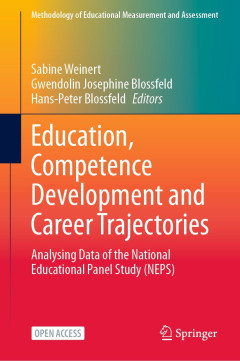
E-book Education, Competence Development and Career Trajectories
This Open Access book presents the results of an interdisciplinary research program to utilize data from the multicohort German National Educational Panel Study (NEPS), which included over 100.000 participants in six nationally representative panel studies. Renowned researchers from the fields of sociology, psychology, educational science, economics, and survey methodology have used the (longit…
- Edisi
- -
- ISBN/ISSN
- 9783031270079
- Deskripsi Fisik
- 423 hlmn
- Judul Seri
- -
- No. Panggil
- 370.113 WEI e
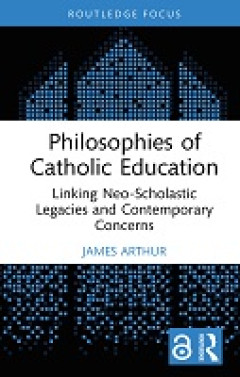
E-book Philosophies of Catholic Education
This seminal volume takes an interdisciplinary approach to presenting an authoritative account of contemporary philosophies of Catholic education, intersecting the substantive boundaries of education, religious studies, philosophy, and theology to ultimately re-examine these philosophies and reinvigorate the authentic aspects of the Catholic educational endeavour. Against the backdrop of an inc…
- Edisi
- -
- ISBN/ISSN
- 9781040104354
- Deskripsi Fisik
- 114 hlmn
- Judul Seri
- -
- No. Panggil
- 377.07 ART p
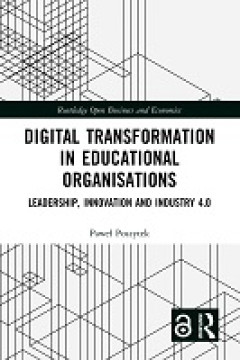
E-book Digital Transformation in Educational Organizations
Technological transformation should lead to enhance people’s potential and the development of their cognitive and social competences, especially those connected with effective communication on different levels. The COVID-19 pandemic has intensified all these processes and, for better resilience and effectiveness at work, it requires now different sets of competences. This book gives direct in…
- Edisi
- -
- ISBN/ISSN
- 9781040039861
- Deskripsi Fisik
- -
- Judul Seri
- -
- No. Panggil
- 371.334 POS d
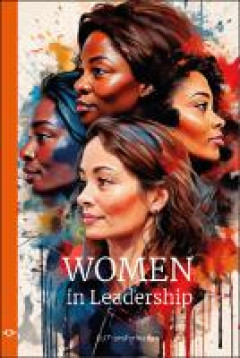
E-book Women in Leadership
This book is not just about women in leadership; it’s a testament to the power of diversity and inclusion in driving organisational growth and success. It’s a call to action for organisations to recognise, nurture, and empower women leaders, not just because it’s the right thing to do, but because it’s essential for their own growth and sustainability.
- Edisi
- -
- ISBN/ISSN
- 9781776489817
- Deskripsi Fisik
- 164 hlmn
- Judul Seri
- -
- No. Panggil
- 305.42 TRA w
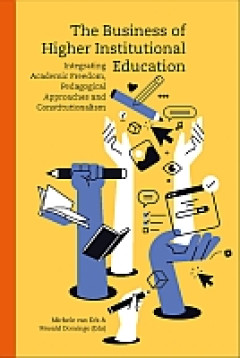
E-book The Business of Higher Institutional Education Integrating Academic Fr…
Higher education is facing increasing challenges. Economic and financial pressures have heightened the strain on the sustainability of higher education institutions (HEIs). These pressures have prompted a shift toward adopting business models and commercial practices to maintain institutional operations. While these changes have enabled some innovations, they have also placed traditional academ…
- Edisi
- -
- ISBN/ISSN
- 9780906785249
- Deskripsi Fisik
- 254 hlmn
- Judul Seri
- -
- No. Panggil
- 378.12 HUN t

E-book Access to Social Justice Effective Remedies for Social Rights
Available open access digitally under CC-BY-NC-ND licence. This book proposes a conception of social justice according to international human rights law. Social rights include everyday rights such as housing, food, fuel and social security. Drawing on extensive research with frontline practitioners, the book frames access to social justice as a journey that should end with the realisation of an…
- Edisi
- -
- ISBN/ISSN
- 9781529237931
- Deskripsi Fisik
- 253 hlmn
- Judul Seri
- -
- No. Panggil
- 323.4 BOY a
E-book Chamber of Shipping : Monaco
The shipping sector supports and enables more than 90 % of the world’s international trade. This complex and dynamic industry underpins passengers' transportation on ferries and cruise ships as well as moving all kinds of cargo on container, bulk and tanker vessels. In the Principality of Monaco, the shipping industry represents in excess of 4% of the country‘s GDP and employs more than 1.0…
- Edisi
- -
- ISBN/ISSN
- -
- Deskripsi Fisik
- 52 hlm
- Judul Seri
- -
- No. Panggil
- 382.449 LEF c
E-book Public Information Act Handbook 2024 : Texas
The Texas Public Information Act (the “Public Information Act” or the “Act”) gives the public the right to request access to government information. Below is a description of the basic procedures, rights and responsibilities under the Act. The Act is triggered when a person submits a written request to a governmental body. The request must ask for records or information already in exist…
- Edisi
- -
- ISBN/ISSN
- -
- Deskripsi Fisik
- 359 hlm
- Judul Seri
- -
- No. Panggil
- 320.8 TEX p
E-book Health Care in America : Trends in Utilization
People use health care services for many reasons: to cure illnesses and health conditions, to mend breaks and tears, to prevent or delay future health care problems, to reduce pain and increase quality of life, and sometimes merely to obtain information about their health status and prognosis. Health care utilization can be appropriate or inappropriate, of high or low quality, expensive or inex…
- Edisi
- -
- ISBN/ISSN
- -
- Deskripsi Fisik
- 135 hlm
- Judul Seri
- -
- No. Panggil
- 362.1068 CDC h
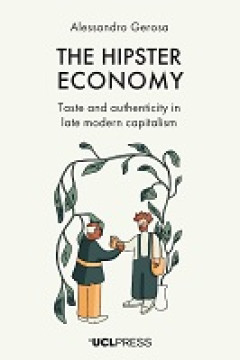
E-book The Hipster Economy
- Edisi
- -
- ISBN/ISSN
- 9781800086081
- Deskripsi Fisik
- 143 hlmn
- Judul Seri
- -
- No. Panggil
- 306.402 GER t
- Edisi
- -
- ISBN/ISSN
- 9781800086081
- Deskripsi Fisik
- 143 hlmn
- Judul Seri
- -
- No. Panggil
- 306.402 GER t
E-book Evil Twins and the Ultimate Insight : Ayn Rand, Vladimir Nabokov, and …
The twinship phenomenon might be a mere curiosity, a quirk of fate and fortune, were the two writers’ legacies less politically fraught and consequential. Both get blamed for a lot of dam-age in the world. Nabokov is sometimes charged, from the right flank, with condoning or committing or making light of pedo-philia (a recent scholarly book promises guidance on Teaching Na…
- Edisi
- -
- ISBN/ISSN
- 9781685710996
- Deskripsi Fisik
- 191 hlm
- Judul Seri
- -
- No. Panggil
- 321.9 STO e
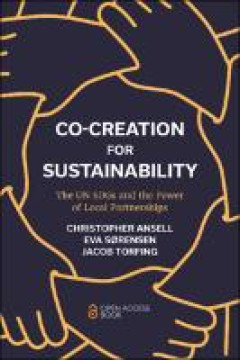
E-book Co-Creation for Sustainability The UN SDGs and the Power of Local Par…
The ebook edition of this title is Open Access and freely available to read online. The UN’s Sustainable Development Goals (SDGs) set an ambitious agenda for global problem-solving and create a framework to achieve it through the power of partnerships. Goal 17 points to the central importance of partnerships, networks, and multi-stakeholder collaborations for bringing together a broad range o…
- Edisi
- -
- ISBN/ISSN
- 9781800438019
- Deskripsi Fisik
- 264 hlmn
- Judul Seri
- -
- No. Panggil
- 338.927 ANS c
E-book Finnishness, Whiteness and Coloniality
“It’s just different here,” is a common way in the Nordic countries for relativizing—that is, eschewing responsibility—for racism. “It’s not our fault we are so white, it’s just the way it is.” These commonly held justifications were presented by the anthropologist Kristín Loftsdóttir during her keynote speech at “The ‘Great White North’? Critical…
- Edisi
- -
- ISBN/ISSN
- 9789523690738
- Deskripsi Fisik
- 373 hlm
- Judul Seri
- -
- No. Panggil
- 320.56 ELM f
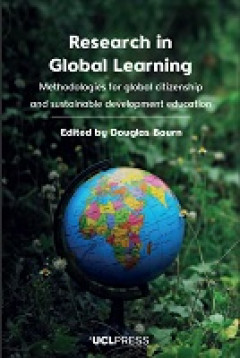
E-book Research in Global Learning
Young people around the world are calling ever more urgently on policymakers to address today’s global challenges of sustainability, structural inequality and social justice. So it is little surprise that learning in a global society, understanding sustainable development and being active global citizens are increasingly popular themes for education at all levels. Educational research makes a…
- Edisi
- -
- ISBN/ISSN
- 9781800083103
- Deskripsi Fisik
- 238
- Judul Seri
- -
- No. Panggil
- 370.116 BOU r
E-book New Horizons for the Alps
We started our respective field research in 2018 and we were somehow surprised not to find an international anthropological community in which researchers exchange and debate ideas in specific journals, meet at conferenc-es and hold working groups on Alpine matters. At the same time, the term “Alpine anthropology” is widely used (Kezich, 2022; Zanini and Viazzo, 2022) and there ex…
- Edisi
- -
- ISBN/ISSN
- 9788860461988
- Deskripsi Fisik
- 310 hlm
- Judul Seri
- -
- No. Panggil
- 301 BOS n

E-book Bring on the Books for Everybody
Bring on the Books for Everybody is an engaging assessment of the robust popular literary culture that has developed in the United States during the past two decades. Jim Collins describes how a once solitary and print-based experience has become an exuberantly social activity, enjoyed as much on the screen as on the page. Fueled by Oprah’s Book Club, Miramax film adaptations, superstore book…
- Edisi
- -
- ISBN/ISSN
- -
- Deskripsi Fisik
- -
- Judul Seri
- -
- No. Panggil
- 306.48 COL b
E-book Indian Agriculture Towards 2030
The historical experience of almost all economies shows that the share of the agricul-ture and allied sectors in total employment as well as in their national income fallswith progress in economic development. This decline does not, however, diminish theneed to address various challenges confronting the agriculture sector, which is a coreconcern in both developed and developing countries. Agric…
- Edisi
- -
- ISBN/ISSN
- 9789811907630
- Deskripsi Fisik
- 322 hlm
- Judul Seri
- -
- No. Panggil
- 338.1541 CHA i
E-book Mapping Water in Dominica : Enslavement and Environment under Colonialism
?e probate that accompanied the suit included a detailed descrip-tion of the property, documenting enslaved laborers, buildings, furniture, ani-mals, equipment, and the disposition of the land. ?e estate in question was in the southwestern quarter of the island of Dominica (maps I. and I.?). For those acquainted with Caribbean estates, this is a familiar story. In their descrip-tion, the docum…
- Edisi
- -
- ISBN/ISSN
- 9780295748733
- Deskripsi Fisik
- 269 hlm
- Judul Seri
- -
- No. Panggil
- 320.58 HAU m
E-book Peri Urban Life Worlds Contested
The opening paragraph of this dissertation originates from Mozambican writer Mia C outo’s1 famous novel The Last Flight of the Flamingo (O Último Voo do Flamingo in Portuguese original). It plays at the end of Mozambique’s civil war, when the Italian United Nations officer Massimo R isi is sent to the village of Tizangara to investigate the mysterious deaths of local United Nations …
- Edisi
- -
- ISBN/ISSN
- 9783515138932
- Deskripsi Fisik
- 329 hlm
- Judul Seri
- -
- No. Panggil
- 304.2 PRE p
E-book Dams, Power, and the Politics of Ethiopia's Renaissance
Fifteen years to the day after making this statement, on 2 April 2011, MelesZenawi laid the foundation stone for what would become the Grand EthiopianRenaissance Dam (GERD), domestically funded and, at 5,150 megawatts (MW)of installed capacity and 74 billion cubic metres of water storage, one of the largestdams in the world. As Turkey had unilaterally built a series of dams upstream onthe trans…
- Edisi
- -
- ISBN/ISSN
- 9780192871213
- Deskripsi Fisik
- 337 hlm
- Judul Seri
- -
- No. Panggil
- 320.12 LAV d
E-book Gaza on Screen
In early May 2021, demonstrations by Palestinians protesting planned evic-tions from the Sheikh Jarrah neighborhood of Jerusalem spread quickly to al-Aqsa Mosque and other parts of East Jerusalem where Israeli authorities had engaged in several provocative actions throughout the month of Rama-dan, including disabling the loudspeakers that broadcast the call to prayer, preventing worshippers fro…
- Edisi
- -
- ISBN/ISSN
- 9781478024576
- Deskripsi Fisik
- 297 hlm
- Judul Seri
- -
- No. Panggil
- 305.8 ABD g
E-book Invited to Witness : Solidarity Tourism across Occupied Palestine
“They called me a tourist, which I found insulting.” So began a reflection by a delegate I interviewed who had gone on solidarity tours to Palestine during the first intifada. She grappled with her discomfort in occupying this term: tourist. She outlined her rationale, explaining that the designation tourism, attached to what she did in Palestine, felt derisive of her work, as though it was…
- Edisi
- -
- ISBN/ISSN
- 9781478093046
- Deskripsi Fisik
- 345 hlm
- Judul Seri
- -
- No. Panggil
- 306.4 LYN i
E-book The Case of Mexico
In this chapter, I employ a model of the consolidated government budget constraint to study the monetary and fiscal history of Mexico. I study the period 1960–2017, dividing it into three subperiods: rapid growth and monetary expansion, 1960–1982; crisis and reform, 1982–1995; and slow growth and macroeconomic stability, 1995–2017. The crisis and reform period includes the major economi…
- Edisi
- -
- ISBN/ISSN
- -
- Deskripsi Fisik
- 40 hlm
- Judul Seri
- -
- No. Panggil
- 338.91 MEZ t
E-book Contract Farming in Developing Countries
Contract farming—described broadly as an institutional arrangement between farmers and businesses to produce and transact agricul-tural commodities against predetermined conditions—is not a recent phenomenon. Yet, a recent wave of agricultural industrialization and the emergence of large-scale food retailing in developing countries may have precipitate…
- Edisi
- -
- ISBN/ISSN
- 9783031764868
- Deskripsi Fisik
- 294 hlm
- Judul Seri
- -
- No. Panggil
- 338.1 NAR c
E-book Unsettling Responsibility in Science Education
As critical science studies scholar Karen Barad (2010) reminds us, “thepresent is not simplyhere-now” (p. 244, emphasis mine). Rather, it isalso a dis/continuous enfolding of heterogenousthere-thens.1This isto say that the central process of this book—accounting for and beingaccountable to the uneven and unequal relation between Indigenousmetaphysics and classical Western metaphysics by w…
- Edisi
- -
- ISBN/ISSN
- 9783030612993
- Deskripsi Fisik
- 379 hlm
- Judul Seri
- -
- No. Panggil
- 375.001 HIG u
E-book Children in Custody Disputes : Matching Legal Proceedings to Problems
he aim of this anthology is to explore how such legal proceedings in, and out-of-court, can be matched with the complex problems that are both caused by, and underlie such disputes. The anthology draws specif-ically on Nordic experiences of resolving custody disputes. However, the challenges are not unique to the Nordic legal systems: they exis…
- Edisi
- -
- ISBN/ISSN
- 9783031463013
- Deskripsi Fisik
- 229 hlm
- Judul Seri
- -
- No. Panggil
- 344.03 BAR c
E-book State of Empowerment : Low-Income Families and the New Welfare State
At around 3:00 on weekday afternoons, dismissal bells ring at thousands of schools across the country. For millions of students, these bells signal not just the end of the school day but also the beginning of another important educa-tional activity: federally funded after-school programs offering tutoring, homework help, and basic supervision.At Jackson Elementary1 in Chicago, the end o…
- Edisi
- -
- ISBN/ISSN
- 9780472131648
- Deskripsi Fisik
- 179 hlm
- Judul Seri
- -
- No. Panggil
- 320 BAR s
 Karya Umum
Karya Umum  Filsafat
Filsafat  Agama
Agama  Ilmu-ilmu Sosial
Ilmu-ilmu Sosial  Bahasa
Bahasa  Ilmu-ilmu Murni
Ilmu-ilmu Murni  Ilmu-ilmu Terapan
Ilmu-ilmu Terapan  Kesenian, Hiburan, dan Olahraga
Kesenian, Hiburan, dan Olahraga  Kesusastraan
Kesusastraan  Geografi dan Sejarah
Geografi dan Sejarah